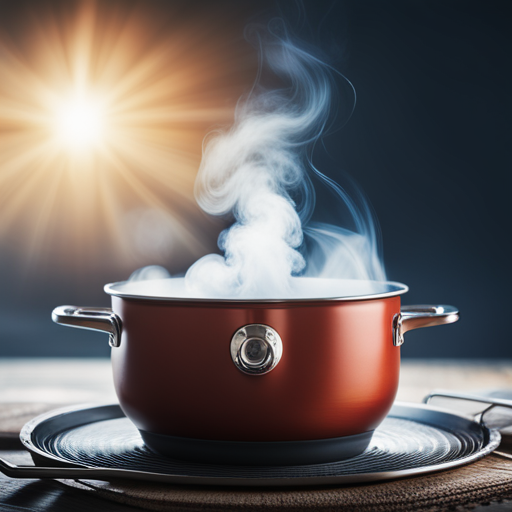Do you ever find that your meals don’t taste quite right? Are you using high-quality ingredients and following recipes precisely, but still not getting the results you want? The culprit may be your water.
Hard water, which is rich in minerals like calcium and magnesium, can have a significant impact on the quality of food cooked in it. While hard water is not harmful to human health, it alters the taste, smell, and texture of food, reduces its nutritional value, and interferes with the cleaning power of detergents and soaps.
If you’re struggling to get the results you want in the kitchen, it may be time to take a closer look at your water quality. In this article, we’ll explore the impact of hard water on cooking and discuss various water treatment methods to help you improve the quality of your meals.
Key Takeaways
– Hard water is rich in minerals like calcium and magnesium, but it is not required for cooking and can change the taste, smell, and texture of food.
– It can cause leaching of certain minerals and nutrients from food, reducing its overall nutritional value, and can affect the texture of food by altering the amount of starch in grains and vegetables, making them less tender.
– Hard water can interfere with the cleaning power of detergents and soaps, making removing stains and residues more difficult, and is the primary reason for white streaks on bathroom faucets, shower heads, and kitchen sink.
– Water treatment methods like water softeners, descalers, and reverse osmosis systems can be used to remove minerals and impurities from hard water, while vinegar and lemon juice mixtures can descale shower heads, faucets, and other fixtures.
Mineral Content and Effects
You may have noticed that hard water, which is rich in minerals like calcium and magnesium, can affect the taste, smell, and texture of your food. This is because the minerals in hard water can interfere with the chemical composition of the food, altering its taste and smell.
Additionally, hard water can cause leaching of certain minerals and nutrients from food, reducing its overall nutritional value. Another effect of hard water on cooking is mineral absorption. When cooking with hard water, the minerals in the water can be absorbed by the food being cooked, causing changes in texture.
For example, starch in grains and vegetables may be affected, making them less tender. This can also affect the final appearance of the food, causing discoloration of light-colored foods. Overall, the mineral content of hard water is an unwanted ingredient in cooking, as it can negatively impact the taste, texture, and appearance of food.
Soft Water Benefits
When using soft water, you’ll notice an improvement in the texture and color of your cooked rice and vegetables.
Soft water is separated from minerals like calcium and magnesium when boiled, which means that it takes less time to cook food. This results in a better texture and color for your meals, making them look and taste more appetizing.
In comparison, hard water can cause leaching of certain minerals and nutrients from food, reducing its overall nutritional value. It can also affect the texture of food by altering the amount of starch in grains and vegetables, making them less tender.
One of the advantages of using soft water for cooking is that it can enhance the taste of your food. Soft water doesn’t change the taste, smell, and texture of food, unlike hard water, which can make it taste and smell unpleasant.
Additionally, soft water doesn’t interfere with the cleaning power of detergents and soaps, making removing stains and residues more efficient.
To experience the benefits of soft water, you can use a water softener, water descaler or reverse osmosis system to remove minerals such as calcium and magnesium from the water. By doing so, you can enjoy better-tasting and better-looking meals without the drawbacks of hard water.
Water Treatment Methods
If you want to improve the quality of your tap water, consider using water softening techniques such as water softeners, water descalers, or reverse osmosis systems.
Water softeners use ion exchange to remove minerals like calcium and magnesium from the water, while water descalers use electromagnetic waves to prevent mineral buildup in pipes and appliances. Reverse osmosis systems, on the other hand, use a semi-permeable membrane to filter out minerals and other impurities.
These methods can help remove the unwanted minerals from hard water and make it suitable for cooking and other household chores. However, it’s important to note that water treatment methods have an environmental impact.
Water softeners and descalers produce salty wastewater that can harm aquatic life and pollute water bodies. Reverse osmosis systems, on the other hand, require a lot of energy and can generate significant amounts of wastewater.
It’s important to weigh the benefits and drawbacks of each method before choosing one. Additionally, it’s always a good idea to conserve water and use it wisely to reduce our impact on the environment.
Conclusion
Now that you understand the impact of hard water on cooking, you may be wondering how to improve the quality of your meals. Luckily, there are several water treatment methods available to help you achieve this.
One option is to install a water softener, which removes the minerals that cause hard water. This will not only improve the taste and texture of your food, but it will also extend the life of your appliances and plumbing.
Another option is to use a water filtration system, which can remove impurities and improve the taste and odor of your water. There are several types of water filtration systems available, including activated carbon filters and reverse osmosis systems.
By investing in one of these water treatment methods, you can ensure that your cooking is free from unwanted minerals and that your food is of the highest quality.
